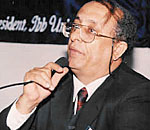
A report on the symposium held at the Department of English, Faculty of Arts, Ibb UniversityEnglish Literature Teaching in Yemen: Problems and Prospects [Archives:2003/645/Education]
June 26 2003
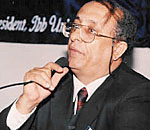 |
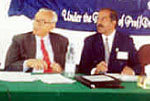 |
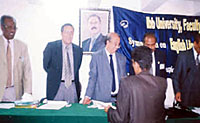 |
 |
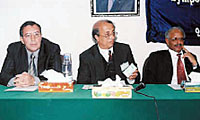 |
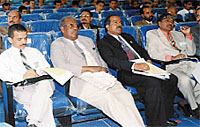 |
College of Education,
Sana'a University
A two-day symposium was organized by the Department of English, Faculty of Arts, Ibb University on May 19-20, 2003 under the patronage of Prof/Dr Mohammed Al-Khadher, President, Ibb University. Prof. Dr Ahmed Alwan Al-Madhaji, Vice-President, Higher Education & Research was the Chief Guest. The symposium was held in five sessions: Inaugural Session, Teaching Poetry, Teaching Drama, Teaching Novel and Comparative Literature and Valedictory Session in which about 14 papers were presented.
The inaugural session began at 9:00 a.m. (May 19, 2003) with recitation from the Holy Qura'an. The Vice-President, Higher Education and Research Ibb University, Professor Mohammed Howat, delivered the opening speech emphasizing the importance of teaching English literature and added that English literature as well as other European or Arabic literature in translation can be used to enhance teaching English for English has gained a wider perspective both in Yemen and in the whole world.
Prof Al-Khadher, President, Ibb University, expressed his hope and happiness in inaugurating the symposium that would bring about changes in teaching of English literature and language. He appreciated the efforts of the Dean of the faculty and the Head of the department of English in organizing such an event. Dr Abdel Shafi Siddiq, the Dean, Faculty of Arts, welcomed all the participants and spoke about the importance of such conferences in advancing the educational activities. Dr Anil Prasad, Head, Department of English, Ibb University, delivered an introductory speech for the symposium. His address provided a curtain raiser to the full-length discussion of the teaching of English literature in Yemen – problems and prospects- and thus gave proper guidance and direction to the symposium.
Prof. Thakur, chairman, Dept of English, Faculty of Arts, Sana'a University made the “beginning” of the end of the inaugural session with his key-note address: Why Teach Literature? He emphasized on the need of proper teaching with clear aims and objectives. He called attention to the need of being judicious in the approach to teach literature because literature, in his opinion, is the source of vitality and energy of one's language. He further underscored that the teachers and the students of English should take the word 'IQRA' as a method to read and read and read to develop their reading habits of literature to achieve their goals.
The second session of the day started at 10:30 a.m. with Dr Rafik Al-Shamiry as the chairperson was devoted to Teaching Poetry. It began by the keynote address of Professor A. K. Sinha, Department of English, Faculty of Education; University of Hodeidah in his keynote address, The Teaching of English Poetry in Yemen highlighted the importance of student's independent reading and response in the exploration of texts. He demonstrated that the text is neither an abstract system nor a concrete artifact but an interactive event in which the text receiver is a social and cognitive agent. Dr Anil Prasad's paper on Teaching English Poetry and the 'Poetic Culture' of Yemen: An Integrated Approach underscored the importance of the 'poetic culture' of Yemen, which is not only a historical reality but also a metaphorical and symbolic schema and can be used to enhance intercultural competence of Yemeni learners of English. Dr Mahmoud Al-Maqtari, from Ibb University presented his paper entitled Is it Language Or Literature? His controversial paper assumed that students are in need of Language more than literature. The last presentation in this session was by Dr Khawlah Kaid Ahmed, Dean of Faculty of Arts, University of Hodeidah on The Power of Literary Texts. She said that a literary text is the product of a writer who himself is a product of a certain social, political and cultural milieu. Therefore the power of a literary text relates from the hidden or implied meaning. Reading between the lines is what gives a literary text its total effect on the reader.
The third session of the symposium was devoted to Teaching Drama and Comparative Literature. It began at 8:30 a.m. on May 20, 2003 with Professor Thakur as the chairperson. Prof Aziz Yusuf Al-Muttalibi, Faculty of Education, Aden University, presented delivered his keynote address on Notes on Teaching Drama. He dwelled upon how a dramatic presentation of a text can make teaching drama enjoyable and useful. Dr Sadek R Mohammed from Ibb University presented a paper entitled Comparative and National Literature: Arabic-English Focus in which he showed how comparative literature might highlight the specificities and idiosyncrasies of national literature. Dr Ayid Sharyan from Faculty of Education, Sana'a University, in his paper Comparative Literature: Its Implications for Yemeni Learners of English focused on Comparative Literature as a means of teaching English literature. Drawing on his experience of teaching literature, he demonstrated how comparative literature can be used in teaching English literature by providing similar passages from Arabic.
The theme of the next session was Teaching Novel. It was presided over by Dr Khawlah Kaid Ahmed. The keynote Address of Prof A. K. Sharma, Head, Department of English, Faculty of Languages, Sana'a University, was on What Do We Teach When We Teach a Novel? He emphasized interrelation between teaching language and literature for the two enhance each other. He was of the opinion that unabridged texts should be taught in advanced levels as in the third and fourth level. The second presenter was Dr R Vivekaanandhan from Al-Nadira branch of Ibb University. He spoke on Literature Teaching: A Language Teacher's Perspective. He gave examples from his experience in teaching poetry. Dr Afaf Al-Saidi, Head, Department English, faculty of Education, Aden University presented a paper on Self-expression in the Selected Novels of Toni Morrison and Alice Walker: A Semiotic Approach. She concentrated on Toni Morrison and Alice Walker, as black American writers, whose works deal with the black experience and celebrate the black community. She showed how a semiotic approach would be relevant in delineating those aspects. Mrs. Estebrak Rashid, from Ibb University, presented a paper on Linguistic Aspects of Humour. Dr. M. N. K. Bose from Ibb University, presented a paper entitled Literacy Skills Or Literary Skills? His focus was on developing the skills of the learners.
In the Valedictory Session the President of the University, the Vice President, the Dean of the Faculty of Arts, and the Head, Dept of English gave out to the participants souvenirs of Ibb University and certificates of appreciation and participation to the presenters and the participants. Dr Rafik Al-Shamiry, a member of the Dept of English and the President of the University Syndicate, concluded the symposium with a vote of thanks.
The significance and success of the symposium can be understood from the observation of the Chief Guest, Prof Al-Madhaji: “It is an important event for Ibb University in particular and the Yemeni universities in general for a number of reasons: for creating interest among the students for English language and literature, for making the students and the future teachers in Yemen aware of the importance of teaching, learning and research, and for enhancing the intellectual climate to bring about a qualitative change in teaching English literature to make it more beneficial to the changing needs of the Yemen of today.”
——
[archive-e:645-v:13-y:2003-d:2003-06-26-p:education]


